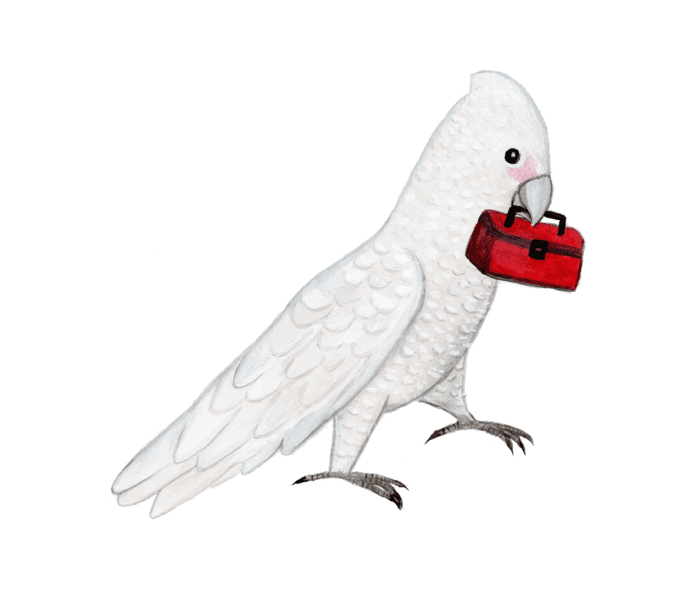Watch out New Caledonian crows, there is a new challenger for the tool use among non-primate species crown. Goffin’s cockatoos have been found to understand tools’ different utilities and to identify when a single tool will do, and when they need a set. This makes them, alongside chimpanzees, the only known non-human animals to use “toolkits”.
The observations were made in an artificial environment, rather than in the wild, but the cockatoos came up with the approach themselves, although only the brightest cockatoos are capable of such mastery.
The discovery has been reported in Current Biology where Austrian researchers followed up on previous observations of cockatoos matching tools to requirements. “With this experiment, we can say that, like chimpanzees, Goffin’s cockatoos not only appear to be to using toolsets, but they know that they are using toolsets,” said Dr Antonio Osuna-Mascaro of Vienna’s University of Veterinary Medicine in a statement.
Even though one species has given its name to Australian slang for a stupid person, cockatoos in general are remarkably intelligent birds. The scientific description in 2004 of Cacatua goffiniana, native to Indonesia’s Tanimbar Islands, alerted scientists to the fact that something about its habitat had led to the evolution of a particularly sophisticated toolmaker.
In 2021 members of the Vienna team contributed to the observation that Goffin’s cockatoos will use up to three tools in sequence to access sea mangoes when temporarily captured from the wild (the cockatoos, not the mangoes). Sea mangoes have a tough outer pit the cockatoos struggle to pierce by beak alone, and have been seen using twigs for assistance in the wild. To overcome the multiple obstacles involved the cockatoos use what the paper calls “A sturdy tool for wedging, a slim tool for cutting, and a long, broad tool for spooning.”
This is an impressive feat under any circumstances, but the findings left researchers with many questions. Foremost among these was whether the birds were addressing each stage of the challenge as it came along, or if they saw the tools as a set. The first would be remarkable, the latter truly groundbreaking in what it says about animal intelligence.
To distinguish between these the authors first created a puzzle where the cockatoos needed to use two tools provided to them, one short and rigid, the other long and flexible, in sequence to access some cashews. Once trained, the birds were confronted with a second challenge, which randomly involved either a task that required both tools, or just the long one. A third test was similar to the second, but the tools were placed in a somewhat inaccessible location.
The toolbox was annoying enough to reach that a bird prefer to avoid a second trip to get an additional tool. However, when the task only required one tool, carrying both was a burden.
Not every cockatoo is equally bright. Of 10 entrants, three weren’t able to work out how to use both tools to access the cashews on the first trial, and another one did so inconsistently. Some got there a lot faster than others, although most got better with repeated efforts.
Of those that graduated from the first trial not all consistently took both tools at once when required. Only one performed near perfectly – taking both tools when needed and only one when not, but two others managed the distinction well above chance.

Given a few years, this could be how cockatoos go seeking food. Toolkits for cockatoos could be the new growth market. Image Credit: Liana Wait
The only known non-human parallel for this involves chimpanzees, who have been seen taking a set of tools to go termite fishing. Notably, however, this behavior is rare even among our nearest relatives, having been observed only in the chimps of Northern Congo’s Goualougo Triangle, a small part of their range.
And just think: before Jane Goodall’s observations of chimps it was believed no non-human species used a single tool, let alone a set.
The paper is published in Current Biology
Source Link: When Goffin’s Cockatoos Go Cashew-Hunting They Bring A Whole Toolkit